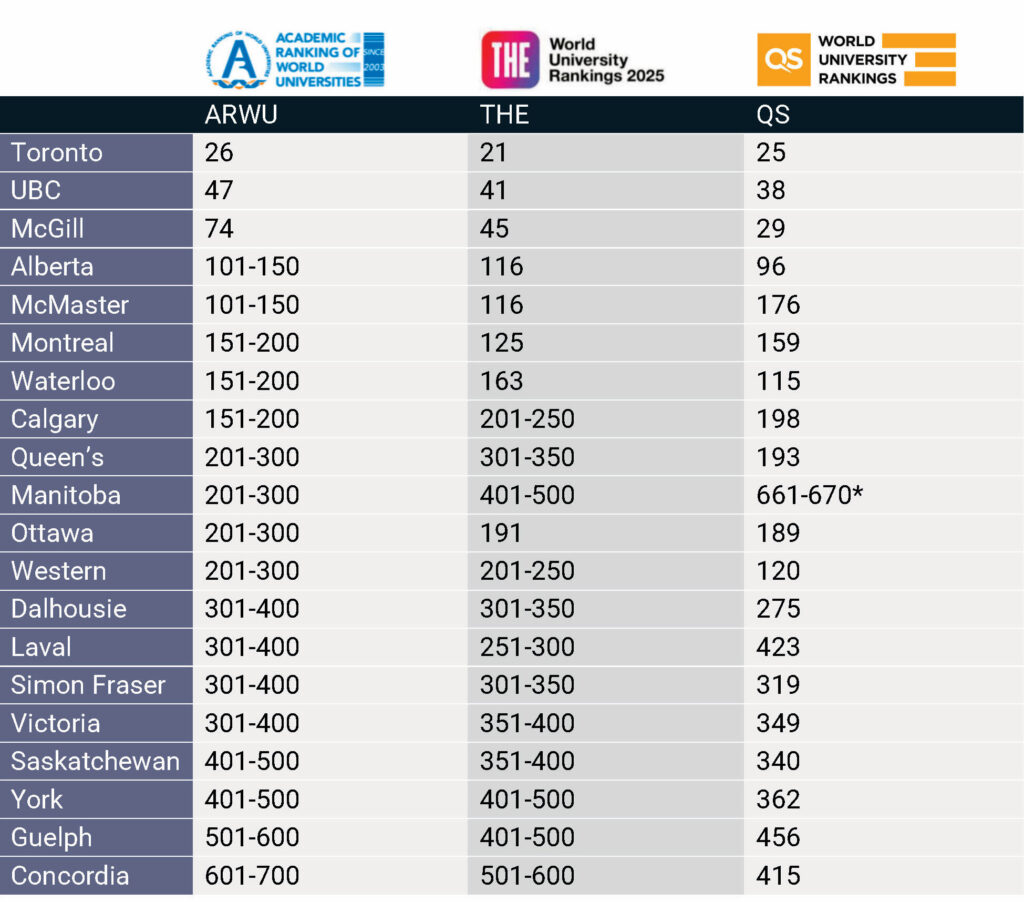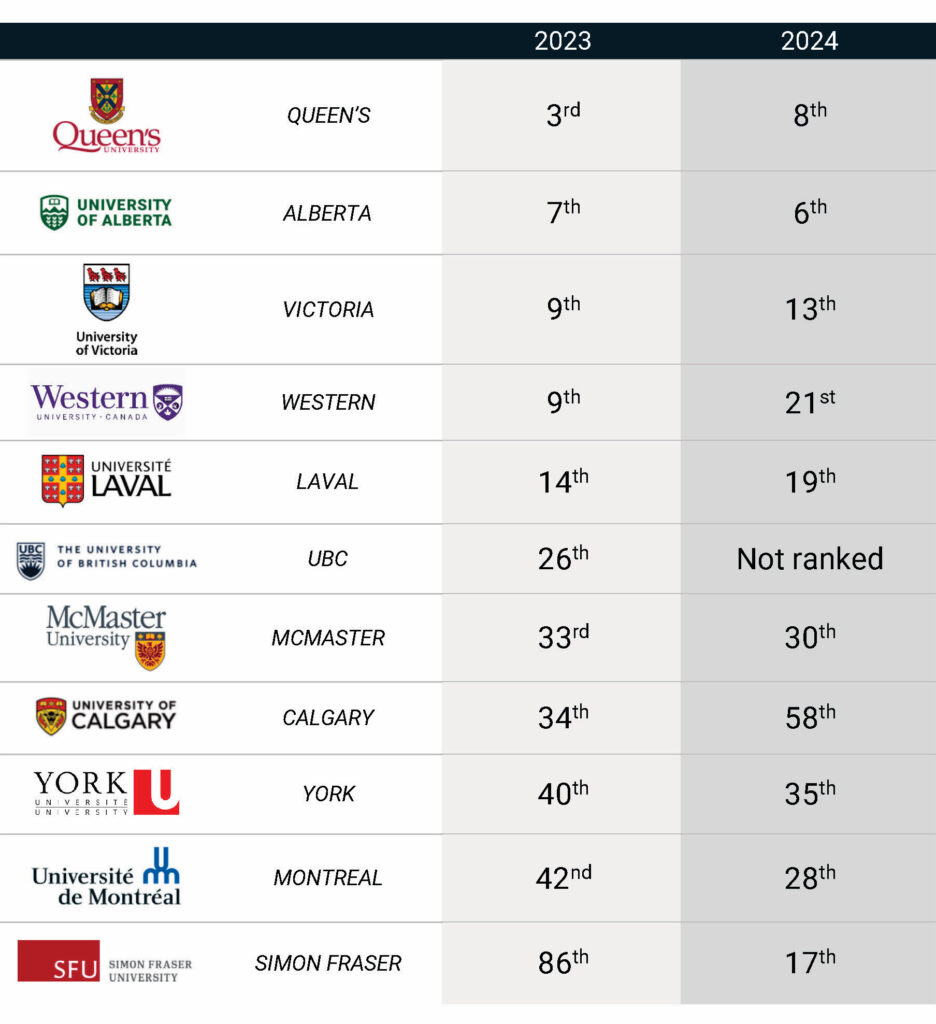Global Rankings Update 2024
Morning all. There are so many international rankings to track from one year to another that it’s easy to go a little glassy-eyed. So now that the 2025 Times Higher World Rankings are out, I thought I would do a little round up.
Let’s start with how Canadian institutions did on the “Big Three” research rankings: The Shanghai Academic Ranking of World Universities (ARWU), the Times Higher Education World University Rankings (THE), and the QS World University Rankings (WUR). Technically, these three rankings are not really measuring the same things. ARWU measures deposits of top scientific talent (its indicators have a strong STEM bias). Times Higher Education is looking for universities with good publishing records and have strong reputations as determined by surveys of academics. The QS rankings are similar to the Times Higher Education, but with some added data on sustainability and graduate employability.
Yet despite these different sets of criteria and indicators, the Big Three rankers are largely in accord with respect to how Canadian universities stack up against the rest of the world. Toronto always comes top, followed by UBC and McGill (QS has those two reversed). Then there is what you might call a “chase group” of Alberta, McMaster, Montreal, and Waterloo, followed by another dozen or so institutions—the rest of the U15 plus Simon Fraser, York, Victoria, Guelph, and maybe Concordia—in a peloton which rounds out Canadian institutions in the top 500. The number of universities in this year’s top 500 have remained constant across the three rankings and so have the number of institutions in the top 50. Where there is a little movement is in the middle zone. QS sees a few Canadian institutions moving up (Alberta, McMaster, Queen’s, and Ottawa in particular); ARWU on the other hand sees Alberta and McMaster going down. The difference likely is that QS is rewarding Alberta and McMaster for relatively good scored on sustainability, while ARWU, which resolutely ignores such topics, does not.
Table 1: How the “Big Three” Rankers See Canada

ARWU and THE are also are fairly united about where institutions lie in relation to one another while QS is a little bit out of synch. Alberta and Queen’s look a little bit better on QS than on the other rankings, mainly because they are good on sustainability, which is not measured in either of the other two rankings. Western looks a lot better on QS, partly because of sustainability but also on employability and citations per faculty. Manitoba is the one institution that looks really different across all three rankings. It gets a boost in the ARWU rankings because of one of its alumni receiving a Nobel Prize in the last few years, and it gets beaten up in the QS rankings because it has not, to date, chosen to submit data to this ranking agency.
Table 2: How the “Big Three” Rankers See Canadian Universities

I could also throw in some data from the Leiden Rankings, that other big reputable research ranking, but being reputable it almost never changes from year to year. Here’s what I said about Canadian performance in Leiden earlier this year—everything still holds (tl:dr, it’s pretty close to what THE and ARWU say, only Queen’s and Manitoba fare worse).
So, what does all this say about Canada’s overall research performance? Well, it’s good but not great. We probably punch just above our weight but given what Canada spends on research in higher education—including the 40% of professorial time devoted to research which is paid for out of simple operating funds, which doesn’t happen everywhere—we should probably have a couple of more institutions in the top 200 of various rankings. But: we’re a country with 0.5% of the world’s population and maybe 2% of its GDP, and we also have by consensus about 4% of the world’s top 500 universities. There are a lot of countries in the world that would change places with us.
Now, let’s shift over to the THE Impact Rankings, which are meant to look at institutions’ contributions towards the United Nations’ 17 Sustainable Development Goals. I wrote in detail about two aspects of these rankings about a year ago: first, i) how seriously opaque/picayune they are and how in many ways resemble a creative writing contest, and ii) the fact that Canadian institutions do incredibly well at them. Well, the opaque/picayune thing was definitely at play this year, because these rankings continue to display huge year-to-year volatility, which generally speaking is an indicator of a weak ranking (universities don’t change that much from one year to the next, why should their rankings move about?).
Table 3: Canadian Institutions in the top 100 of THE Impact Rankings, 2023 vs. 2024

Canadian institutions at the top of the THE Impact rankings tended to do worse this year than last year; of the five at the top of the ranking, only University of Alberta avoided a drop. But among those who finished 30th or lower in 2023, only Calgary saw a drop. The other five all rose in the rankings, in some cases (Dalhousie and especially Simon Fraser) pretty spectacularly. UBC seems to have been dropped from the rankings for reasons I have not been able to identify, but the obvious explanation is that the institution simply chose not to submit data (see below).
You’re probably wondering whether Canada, with 12 institutions in the top 100 of this ranking is punching above its weight. To which the answer is maybe, but. Remember there are huge numbers of “top” universities around the world which choose not to participate in these rankings. In fact, I am pretty sure none of the 20 “top” universities in the THE’s more research-intensive set of rankings participates in the Impact Ranking, precisely because they see no reason to join any ranking that doesn’t guarantee them a top 20 spot (in the same vein, it is notable that none of McGill, Toronto, or UBC chose to submit this year). So maybe we have socially responsible universities, maybe we have universities that are good at telling their stories about social responsibility, and maybe we just benefit from a lot of big universities just not turning up. Hard to tell.
Tomorrow: a look at some new initiatives in rankings.

 Tweet this post
Tweet this post

Some big movements in some of the ARWU global subject rankings for Canadian universities between 2023 and 2024 which make no sense unless they had a major methodology change.
Could the universities themselves have changed the data they’re sending in?
Could they have started counting Nobel laureates currently on staff, or who are alumni, rather than who earned their prizes for research undertaken at the institution? Could they count a co-authored article as an article for each, rather than one article for the institution?
These are kind of extreme examples, but more generally, I wonder how much the rankings are subject to salesmanship, to “telling one’s story better” and, ultimately, to B.S. All of which is ultimately a reason to ignore them.